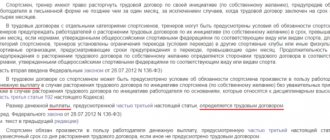A fixed-term employment contract, as is known, is concluded for a specific period. Its maximum period is limited to five years, and there is no minimum period of validity. The legal side of the issue of a pregnant woman working under a fixed-term contract is regulated by the Labor Code of the Russian Federation, in detail:
- Art. 59 - rules for concluding a fixed-term employment agreement.
- Art. 77 - general grounds for dismissal.
- Art. 79 - termination of a fixed-term agreement.
- Art. 84.1 is the generally accepted procedure for formalizing the termination of an agreement.
- Art. 261 - valid guarantees for pregnant women upon dismissal.
Labor relations between a pregnant woman and an employer, in terms of a fixed-term agreement, are determined by the general norms of labor legislation. Most employers cannot fire a pregnant woman on their own initiative. The law prohibits doing this.
Prohibition on dismissal of a pregnant woman
Most female employees believe that the boss will not be able to terminate a fixed-term employment contract with a pregnant woman. According to Russian law, it is prohibited to dismiss such employees at the request of management.
Reference! An exception to this rule is specified in Part 1 of Article 261 of the Labor Code of the Russian Federation - the liquidation of an organization or individual entrepreneur is a reason for the dismissal of even a pregnant employee.
If the temporary agreement has expired, current legislation does not consider this as termination of a fixed-term employment contract with a pregnant woman. Therefore, the company’s management on this basis may simply not renew it, thereby “saying goodbye” to the employee.
If a woman replaces an absent employee
However, there are some nuances in which a fixed-term employment contract, dismissal and pregnancy are not mutually exclusive concepts. This applies to cases where the expectant mother replaces a temporarily absent employee who can begin to perform his professional duties at any time.
This means that every day of work of the pregnant woman replacing him may be the last. In this case, according to the law, she should be transferred to another vacant position until the end of the pregnancy. Moreover, this job may pay less or require less qualifications.
If there are no vacancies or the employee refuses them, then, in accordance with the law, her dismissal will be legal.
Grounds for dismissal
According to clause 3, part 1, article 77 of the Labor Code of the Russian Federation and clause 1, part 1, article 77 of the Labor Code of the Russian Federation, there are no obstacles to terminating the agreement at the request of the expectant mother or by mutual consent of the parties. If a woman wants to terminate the contract herself, she writes a statement addressed to the manager, in accordance with Article 80 of the Labor Code of the Russian Federation.
Attention! Dismissal of a pregnant woman under a fixed-term employment contract is possible after 14 days after the application or on any day on her initiative. If a pregnant woman decides to keep her job, she can withdraw her application. In this case, it will not be possible to fire her - this is indicated in Part 4 of Article 80 of the Labor Code of the Russian Federation.
But if
the boss terminated the contract , then she can demand reinstatement through the court .
Therefore, the administration should be informed of the possibility of withdrawing your application. If the woman has not changed her decision, it is better to record this decision in writing. Another option is the dismissal of a pregnant woman under a fixed-term employment contract by mutual agreement with her superiors. In this state of affairs, she may cease to perform her work duties any day before her official dismissal. But management should be notified about this in advance by means of a statement.
On the day of dismissal, mandatory documents are issued and payments .
The main difference from permanent employment is that a fixed-term employment contract with a pregnant woman does not give her the opportunity to receive financial assistance to care for the baby.
Expert explanation
Rostrud on the information portal “Online inspection. RF”, in response to a user’s request regarding this issue, reports the following.
If a fixed-term agreement is extended at the request of a woman until the end of pregnancy, she should be presented with a corresponding certificate from doctors every 3 months. The employer can fire her only under the following circumstances:
- When the child has already been born, after maternity leave (if it was provided at the request of the employee).
- At the end of pregnancy, the employer has the right to dismiss the employee due to the expiration of the agreement within a week. The countdown starts from the day (date) when he became aware of this (or he should have known about it).
Rostrud also draws attention to the fact that if, contrary to the norms of the Labor Code of the Russian Federation, an employer fires a pregnant woman, the woman can immediately turn to the trade union or labor inspectorate for help. Also, no later than three months later, the dismissed person has the right to demand restoration of her rights in the labor dispute commission or city (district) court.
Expert opinion
Musikhin Viktor Stanislavovich
Lawyer with 10 years of experience. Specialization: civil law. Member of the Bar Association.
It is noted that if the dismissed person misses the established period due to an appeal to other authorities (trade union, etc.), then the deadline for going to court will be considered missed.
Example 1. Dismissal of a pregnant woman upon expiration of a fixed-term agreement
Citizen Druzhina V.N.
works at Vasilek LLC under a fixed-term agreement, which expires on March 20, 2021. Since the woman is in an “interesting position,” she has the right to write a statement addressed to the employer to extend the agreement.
If Druzhina V.N. takes such an initiative and confirms her pregnancy with a medical certificate, the employer will not be able to fire her when the agreement ends.
Druzhina V.N. did not write an application for extension. The employer fired her on March 20, 2018 due to the expiration of the fixed-term agreement. His actions are lawful and cannot be disputed.
Example 2. Dismissal of a pregnant woman when the main employee returns to work
At Vasilek LLC, under a temporary agreement, a pregnant woman was hired to replace a temporarily absent permanent employee. Soon the main employee returned to work.
Taking into account the current situation, an employer can fire a pregnant woman only in two situations. If there are no vacant positions at all. Or, if there are vacancies, they were offered to the pregnant woman, but the offer was rejected.
Since there was one vacancy at Vasilek LLC at that time, the employer offered it to the pregnant woman. The position turned out to be less paid than the previous one, so the woman refused it.
Considering that there were no other vacancies, the employer began formalizing her dismissal in a general manner. The actions of the head of Vasilek LLC are lawful.
Dismissal if a pregnant woman was hired on maternity leave
If an employee temporarily replaces another, the manager may not renew the contract under one condition: if, upon the return of the former employee , she refuses to take another position . According to Part 3 of Article 261 of the Labor Code of the Russian Federation, she must be offered alternative vacancies that correspond to her education and health status.
Important! The employer may provide a position with a different salary. There are no restrictions in the legislation on this point. However, if there are no alternatives, the woman will have to make room for the previous employee.
Agreement of the parties
An alternative equivalent to voluntary dismissal. When termination of the contract is carried out on the initiative expressed by both parties.
| Questions | Statement | Agreement of the parties |
| How to register | The pregnant woman writes the application herself , and the employer then issues the order. | An agreement is drawn up confirming the agreement of the participants. One writes, and the second, after reading, checks the content. The document is obtained in 2 identical copies, which the parties sign. The employer then issues the appropriate dismissal order. |
| Parties against | If an employee worked honestly for 2 weeks or was on sick leave for health reasons, the employer will have to fire him. | When the boss or the pregnant woman herself does not agree with the contents of the contract, they have the right to refuse to sign there. Then you won't be able to fire the person. Another option is for the parties to discuss the situation and draw up a protocol , which reflects point by point where they disagree. If the participants subsequently fail to reach an agreement, dismissal will also not occur. |
| date of dismissal | It is not the number indicated by the employee on her application that is counted, but the day on which her 2-week work period . | Negotiable, it is indicated by both parties. According to the agreement, by the way, a pregnant woman has the right to quit immediately, without working off. |
A common feature is a voluntary desire expressed by a pregnant employee. Therefore, such dismissal is in accordance with the provisions of the Labor Code of the Russian Federation.
If a woman who signed an earlier agreement between the parties later finds out about pregnancy, she has the right to send a new notification to the employer. Where it recognizes the contract as canceled and notifies the other party of a change in its position.
The main thing is to have time to complete this before the day specified in the agreement as the date of dismissal.
Extension of a fixed-term employment contract with a pregnant woman
If an employee wants to keep her job, she needs to have time to conclude a new contract before giving birth. When she goes on maternity leave until it ends . This rule is regulated by Part 2 of Article 261 of the Labor Code of the Russian Federation .
In order for a manager to be able to formalize the extension of a fixed-term employment contract with a pregnant woman, she herself must meet a number of requirements:
- provide a medical certificate, confirming the presence of pregnancy;
- send written notice of your desire to continue working for the company;
- if it was extended until childbirth, the employee must confirm her position every three months by bringing the appropriate certificate;
- if the pregnancy does not end in premature birth, the manager has a week to terminate the contract . This applies to employees who continue to work and are not on maternity leave;
- If a woman goes on maternity leave , her boss will be able to fire her on the day it ends .
Reference! The expectant mother should ask the manager to provide written notification of the need for additional confirmation of pregnancy.
According to paragraph 4, part 2, article 57 of the Labor Code, the contract must indicate its validity period. Therefore, when extending, it is necessary to create an additional agreement (Article 72 of the Labor Code of the Russian Federation) listing the new working conditions. Amendments are fixed by a separate order.
What is not considered grounds for dismissing an employee?
It is useful for expectant mothers to clarify their own rights when an employer cannot deprive them of their workplace:
- When an employee wants to stay and her departure is beneficial only to her superiors.
- The manager is sure that she has ceased to cope with the main job responsibilities. Unsuitable professionally.
- The girl's trial period was unsuccessful - the results were worse than the manager expected.
- The pregnant woman got a temporary job and another, permanent replacement has already been found for her. For example, a girl was hired when there was no permanent vacancy.
It happens that, having found out about the employee’s situation, the boss himself insists that she leave. However, he has no right to force.
It doesn’t matter how unprofessionally a woman performs her job duties or how she violates discipline. He can punish - with a reprimand, a fine, but he can expel him - no .
Deadlines
To receive maternity leave, you must provide a sick leave certificate and support it with an application . 3 days before its end, the boss is obliged to inform about the termination of a fixed-term employment contract with a pregnant woman. The manager is advised to notify about the end date of maternity leave and dismissal when the employee submits a statement.
If for some reason the pregnancy is interrupted , the boss can terminate the contract within a week . But this is only possible when the woman provides a medical certificate.
Attention! If an employee has a premature birth, the manager does not have the right to deprive her of her job.
If the boss has doubts that a woman is pregnant, he has the right to find out information from her, without obtaining a certificate. But it is better to ask the employee for a document confirming the fact of pregnancy.
Can a pregnant woman be fired?
Even here you should not despair, because a pregnant woman in any case has a fourteen-day period during which she has the right to withdraw the submitted application for resignation . In this case, the woman needs to write a statement to withdraw her resignation letter.
In this case, the woman can really leave her job, since no one took this right from her . True, a situation may occur when a woman, for objective reasons, but not yet knowing about her pregnancy, decides to quit her job of her own free will, writes a statement and submits it to the personnel department. And in a few days she will learn about her situation. What to do in such a situation?
Maternity leave for a fixed-term employment agreement
As with an indefinite term, it is fully paid for. The amount of the benefit is calculated based on the length of work experience and salary . If a woman works for less than 6 months , then the benefit is calculated from the minimum wage established by the regional authorities. The organization will pay only the first 3 payments , the rest by the Social Insurance Fund . Before its end, the employer does not have the right to terminate the employment agreement.
If the expectant mother has been refused payment for maternity leave, she can appeal this decision through the court . But a pregnant woman should take into account that while on maternity leave, the former employee may leave. And the employer has the right not to renew her contract if she refuses to move to a new position.
Then she will not be paid child care benefits . To obtain it, a woman will have to contact representatives of social protection authorities with the necessary package of documents. Minimal financial assistance will be provided per child. If the employee is on leave at the end of the contract, the payment of benefits is temporarily suspended. Until the boss transmits the relevant information to the social security authorities.
Employer Tricks
Knowing the law, many managers try to somehow circumvent it. A pregnant woman is inconvenient for them as an employee.
Most of the original reasons are illegal under the law and citizens should know this:
1. A woman has 2 jobs , it turns out that she combines one with the other. It turns out that the 2nd employer is responsible for it.
2. They inform her that the owner of the organization/board of shareholders/chairman decided to fire her.
3. Dismissal is prohibited, no matter how severe the disciplinary action against her.
4. Intractable bosses try to worsen the employee’s situation. Create unbearable conditions for her so that the woman runs away on her own. It is illegal.
Find out something important: Can you be fired on sick leave?
Hard work associated with prolonged stress is contraindicated for pregnant women. In return, the manager may refuse to transfer the employee to an “easy” position, justifying the lack of such at the enterprise. Then the woman can not perform some job responsibilities and at the same time, maintain her usual income.
It is impossible to expel an employee - for absenteeism, regular tardiness, immoral behavior or other misconduct.
5. Even the theft or distribution of trade secrets is considered insufficient grounds .
True, for recent violations, the employer has the right to “punish with rubles” or reprimand . In addition, pregnancy is a temporary condition. After childbirth and the end of all maternity leave, a woman becomes an ordinary employee.
Learn important things: Postpartum payments
Payments
On the day of dismissal, the manager must pay his employee in full, if the full payment was not made before the start of the maternity leave. She is entitled to additional payments:
- salary for the number of hours worked;
- compensation for vacation days that were not used;
- maternity benefit, which must be calculated within 10 days . It is issued upon receipt of wages.
A woman must receive all of the above payments regardless of the type of employment contract.
Important! If the employer violates the described norms, the woman has the right to go to court. To do this, you must provide copies and originals of all medical certificates confirming her position, notice of termination of the contract and order. Usually the court takes the employee’s side and she is reinstated in her previous position.
When can you fire pregnant employees?
The boss cannot take his own initiative and kick the woman out. It's taboo . Circumstances occurring outside his will or desire are considered grounds permitted by law. Also – the initiative of the employee herself.
Liquidation of a legal entity
The procedure for dismissing such employees is regulated by the provisions of Article 180 of the Labor Code of the Russian Federation . If the employer's company is facing liquidation, he is obliged to notify all employees, including the expectant mother, (2 months) Moreover, send out not oral, but written notifications.
When a company is not destroyed, but changes ownership, this is a different situation. The employee must keep her job; she will only have a new boss. If he doesn't want to resign on his own.
A pregnant employee has the following guarantees if the organization where she works is destroyed:
- A severance pay is due, the amount of which is equal to her usual average monthly earnings;
- Payment of compensation for days of unused vacation;
- 2 months receives his salary;
- Receives a paycheck based on the days she worked in the last month.
Her pregnancy benefits will be paid by the Social Security Administration , the local branch, instead of the employer.
Normative base
The Labor Code has the following articles that directly or indirectly relate to pregnant women:
- 64 – on the impossibility of refusing to conclude a contract indicating employment (if the reason is pregnancy);
- 70 – about the inadmissibility of assigning a probationary period if they are hired;
- 78 – about dismissal, the reason for which is the agreement of the parties;
- 80 – about settlement on individual initiative;
- 180 – on compensation for damage during the liquidation of a company;
- 234 – on compensation in case of dismissal not according to the law;
- 261 – on the impossibility of settlement if the employer takes the initiative (liquidation of a company is an exception, Article 81).
There is also Article 145 in the Criminal Code, which comes into force if the expectant mother is unjustifiably not hired or improperly fired. Next, we will consider different types of dismissal.
Pregnancy confirmation
If pregnancy is not confirmed in time, the employer will most likely try to terminate the contract. In this case, the employee has the right to go to court and, most likely, she will win this case. The employer has the right to require the woman to provide a certificate every 3 months. But there are times when the boss starts doing this every month. In this case, the woman has the right to ignore his requests and bring the certificate at her own request.
Initially, the employee presents the certificate as a warning to the employer about her situation. But this is only if the employer himself requires a document of such a plan. The woman must be instructed in advance by her management that if she is pregnant, she will have to provide a medical certificate. After the briefing, they must put their personal signature.
Otherwise, if a woman refuses to provide a certificate, independent parties are invited and must record the fact of refusal by signing the document.
What to do if the rights of a pregnant woman are violated by an employer
Although legislation protects pregnant women, in practice some managers commit unjustified dismissals.
An employee has the right to appeal such a decision:
- at the State Labor Inspectorate;
- in the prosecutor's office;
- in a court.
The forced dismissal of an employee who is an expectant mother threatens a negligent employer with serious consequences. He may be subject to administrative (a fine and reinstatement of the employee's position) and even criminal liability .
The victim can visit the relevant authorities herself, file a claim, attaching the necessary documents: a dismissal order, a medical certificate and others that will help confirm her arguments.
Violated civil rights will be restored:
The lost position will be returned to her, and the employee has the right to receive a duplicate of the old work book, which does not contain a record of the dismissal.
She will receive compensation and all days of her forced absence will be taken into account .
In addition, the employer will compensate for moral damages and will receive punishment.
Moreover, an employee defending his violated rights in court is not obliged to pay state duty (Article 393).
Basic properties of a fixed-term contract
A fixed-term contract (sample can be downloaded on the Internet) is a form of relationship between the employer and the working class, when the parties know the expiration date of the contract. Russian legislation establishes the conditions under which such an agreement can be concluded:
- If temporary replacement of a key employee is required.
- Recruitment of personnel for seasonal work.
- Temporary work related to production expansion.
- Other cases that are reflected in labor legislation.
According to the Labor Code of the Russian Federation, such an agreement cannot exceed five years. In Russian practice, the most popular contracts are those concluded for three or five years.
Employees who are hired under a fixed-term employment contract are different from those employees whose contracts are open-ended. There are both pros and cons of these differences, which are presented in the table:
Advantages:
- no probationary period required;
- the exact time of completion of the work is known.
Disadvantage: if the contract period is less than two months, then the employee does not have severance pay, and he may also be required to work on weekends and holidays (with his consent). At the same time, only the financial part of the work is compensated; days off are not provided for this.
Upon dismissal, an employee who has entered into a fixed-term contract is required to notify the manager three days before writing a letter of resignation.











